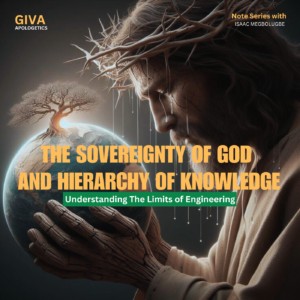The Sovereignty of God and the Hierarchy of Knowledge: Understanding the Limits of Engineering

Isaac Megbolugbe
July 26, 2024
In the grand tapestry of human understanding, God’s sovereignty weaves an intricate pattern of knowledge, with each thread meticulously placed to reveal His divine design. From the majestic laws of physics to the intricate workings of the human heart, all knowledge originates from God’s omniscient mind. However, humanity’s pursuit of understanding is filtered through a hierarchy of reasoning, with engineers situated near the practical reality end of the spectrum.
Engineers, masters of precision and clarity, excel in applying the laws of nature to create innovative solutions. Their expertise is indispensable, yet their proximity to practical reality can also be a limitation. The very precision that makes them exceptional engineers can render them impervious to learning from others who engage in higher-level reasoning. This creates a challenge for development and progress, as engineers may overlook the broader implications and underlying principles that govern their work.
The hierarchy of knowledge, with God at its pinnacle, descends through levels of abstraction, from theology and philosophy to science and engineering. Each level builds upon the previous one, with engineers operating at the practical application end. While this hierarchy is not a rigid classification, it acknowledges that different disciplines require varying degrees of abstraction and reasoning.
Engineers’ reluctance to collaborate with those engaged in higher-level reasoning stems from their focus on tangible results and their expertise in precise application. However, this narrow focus can lead to a lack of consideration for the underlying principles and broader implications that govern their work. By neglecting to engage with higher-level reasoning, engineers may overlook innovative solutions, ignore potential pitfalls, and fail to integrate their work into the larger tapestry of human understanding.
To foster development and progress, engineers must recognize the value of collaboration with those who engage in higher-level reasoning. By acknowledging the hierarchy of knowledge and their place within it, engineers can:
1. Appreciate the broader implications of their work
2. Integrate their solutions into the larger context of human understanding
3. Learn from others who operate at different levels of abstraction
4. Recognize the sovereignty of God as the ultimate source of knowledge
By embracing this collaborative approach, engineers can transcend their limitations and contribute to a more comprehensive understanding of God’s design. As we acknowledge the hierarchy of knowledge and the sovereignty of God, we can work together to unravel the intricate tapestry of human understanding, revealing the divine beauty that underlies all creation.

Dear Engineer Friends,
I hope this letter finds you well. As someone who has had the privilege of working with many engineers over the past three decades in the real estate and development industry, I wanted to share some observations and concerns that I believe are essential to our collaborative success.
While I have immense respect for the technical expertise and precision that engineers bring to the table, I have also experienced instances of intransigence, failure to listen, and a reluctance to learn from others. This has led to missed opportunities for innovative solutions and, at times, hindered progress.
I understand that your education and training emphasize precision, accuracy, and problem-solving within well-defined parameters. However, this can sometimes lead to a narrow focus, causing you to overlook the broader context and neglect the value of input from those outside your field.
I want to emphasize that my intention is not to criticize or diminish the vital contributions engineers make. Rather, I hope to encourage a more nuanced understanding of the complexities involved in collaborative problem-solving.
I believe that engineers, like anyone, can become predictable in their responses and approaches due to their education and practice style. I urge you to recognize the value of diverse perspectives and be open to learning from others, even when it challenges your expertise.
Let’s work together to forge solutions that integrate our collective knowledge and expertise. I would love to hear your thoughts, experiences, and insights on this matter, especially in the context of an article that I wrote about this issue in GIVA Apologetics Ministry.
Best regards,
Isaac Megbolugbe
July 26, 2024
👍👍👍👍👍👍👍👍
This article beautifully articulates the intricate relationship between the sovereignty of God and the hierarchy of human knowledge. The perspective that all knowledge originates from God’s omniscient mind, with engineering positioned near the practical reality end, provides a profound understanding of how different disciplines contribute to the tapestry of human understanding.
The call for engineers to recognise and collaborate with those engaged in higher-level reasoning is particularly insightful. By acknowledging the broader implications of their work and integrating it into the larger context of human understanding, engineers can transcend their limitations and contribute more holistically to society.
In recognising God’s sovereignty as the ultimate source of all knowledge, how can individuals from various fields of study and practice work together to ensure a more holistic understanding of our world? What role can educational institutions play in fostering this kind of interdisciplinary collaboration and appreciation for different levels of abstraction?
This treatise aptly and avidly places God at the foundation and apex in the hierarchy of knowledge while engineers function in concrete, physical and orecisional centre. It also seems to me interrogate the multidisciplinary of knowledge as a lifelong endeavor, in which the human and social sciences play invaluable role in humanizing concrete technological, innovative findings. Truly profuse.